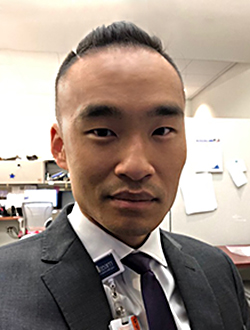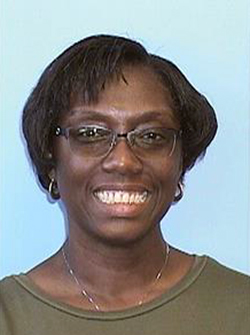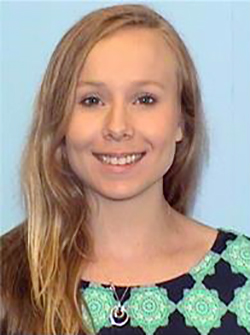Meet Some of Your Respiratory Therapist Heroes @ UVA
Respiratory therapists (RT) are healthcare professionals trained specifically to deal with patients with an impaired ability to breathe, whether through illness or injury. They provide expert advice in ventilation strategies, inhaled medications, bronchial hygiene, diagnosis of parasomnias, and the performance of high-quality lung function tests. Respiratory therapists work in acute care settings such as hospitals and emergency departments, long-term care facilities, diagnostic laboratories, home health, and physician offices and clinics.
UVA Health respiratory therapists have expertise that has been essential in responding to the demands of the pandemic. In recognition of National Respiratory Therapist Week October 24 - 30, 2021 and to honor our UVA respiratory therapists, we want to share some of their stories with you. They find joy in making a difference in the lives of people who are in distress and sometimes at the brink of death, and the relationships they develop, the bonds and trust they earn, shape who they are. Meet your RT team @ UVA Health.
PLEASE TELL US ABOUT YOURSELF.

Michael O'Brien - As a Pediatric Outpatient Clinic and Pediatric Home Ventilator Program Specialist, I advise physicians in the care of children with complex medical needs and manage children with tracheostomy tubes and ventilators. One project I'm proud of is UVA's Pediatric Home Ventilator Program, which I helped create and shape. It was born from the twin needs for an interdisciplinary team to follow complex children after discharge and the need to systematically and effectively train caregivers to care for these children. Children with tracheostomy tubes and long-term ventilation require the most support because of the many potential risks on the patient and demands on the family. Since implementing the program, several improvements have been observed: decreased total length of stay, decreased all-cause mortality, and decreased emergency department admissions.
Laura Fails - As an RT for heart patients, I help provide relief for patients at sometimes the scariest moments of their lives as they struggle to breathe or face a long battle to recovery. We make a difference in people's lives. Our colleagues value what we do, and we appreciate the contribution of the entire UVA medical team; we all have an important role to play.
Bessie Brooks - I work in the Shift lead role, meaning I ensure we have enough staff, equipment, and supplies for our RT team to do its job. I also troubleshoot difficult RT patients, develop treatment plans for patients in the Emergency Department who come in with breathing problems such as asthma, COPD exacerbation, drug overdose or traumas, and I make sure that the managers and directors are aware of what is going on clinically at the bedside.
Brytany Minder - As an RT for the Surgical/Trauma ICU and the Nerancy Neuro ICU, I collaborate with my colleagues to ensure we support best practices based on the latest evidence-based medicine.
WHAT IS THE MOST REWARDING PART OF YOUR JOB? THE MOST CHALLENGING?

Bessie Brooks - RTs choose this profession because they feel joy out of making a difference in the lives of people who are in distress and almost, or are, at the brink of death. Even though we support our patients with their breathing issues, we also develop a relationship, bond and trust with them that they will never forget. At the same time, we are the experts providing mechanical ventilation to the sickest patients with COVID and have borne the burden of managing a huge volume of sick people without the relief of extra help, and often with shortages of critical supplies.
Brytany - The most challenging part of being a respiratory therapist is also the most rewarding. It can definitely feel like our specialty is under-appreciated and unrecognized in the field of health care. To be honest, I hadn’t ever heard of respiratory therapy before applying to the program in undergraduate school. We like to introduce ourselves to patients as someone who is going to help them breathe easier. That is just the simpler way of saying that we are masters of mechanical ventilation, bronchial hygiene fanatics, lung inflation enthusiasts, and professional pokers of arteries!
Michael - The long-term relationships that I build with patient families and healthcare providers are the richest reward. The privilege of being present through what is sometimes several years of life of a child grants a kind of investment and a degree of trust that is surprising, humbling, and awe-inspiring. And the rapport and collegiality that this position has allowed me to have with other healthcare providers is a unique professional affirmation that respiratory therapists belong in this role.
Laura - The most rewarding part of our job is seeing a person who has been intubated for weeks, if not months, get out of bed for the first time, eat for the first time, walk for the first time – perhaps even speak for the first time, bringing their loved ones to tears, who thought they may never hear that person’s voice again, or feel their presence beside them. The most rewarding part is when those weeks and months culminates in that person going home or to rehab to continue their path of recovery.
HOW HAS THE COVID PANDEMIC IMPACTED YOUR AND YOUR TEAM'S WORK THIS YEAR?

Laura - The fear that we all felt in the beginning was the same as yours. We would ask ourselves, "How do we keep ourselves, our families, and our patients safe?" COVID brought about a new understanding of the impact of respiratory viruses and how they can evolve into something we’ve never seen before. We observe and we adapt. Our medical team has been phenomenal in providing evidence-based treatment plans and interventions to our community.
We’ve lost so many in this fight. We were already tired of not being heard before the pandemic, and then all of the heaviness [of the pandemic] continued to weigh on us with seemingly no end in sight and very little reprieve.
Brytany - We are already a small department with a need for RTs throughout the hospital. When staffing continued to take a huge hit throughout the year, we found ourselves being spread more thin than ever before. The bedside RTs really demonstrated just how strong and resilient we are, even when things become impossible.
Michael - For my families, the pandemic has tested them immensely. Most of them have demonstrated a personal brilliance, but none of them would boast of doing well through these trying times. The fear of getting sick and not being able to care for their child, of not having supplies because of global shortages, and the strife over vaccinations and masking have all weighed heavily on them.
Bessie - The COVID pandemic has been a big burden on everyone. We have relied on each other to get through the tough parts, working long hours (16-hour shifts), working extra shifts, working in areas where we weren’t particularly comfortable. I was recently diagnosed with COVID and was vaccinated, but am very thankful that I did not have to be hospitalized. My coworkers checked in on me to see if I needed anything and I am grateful.
WHAT ARE SOME TAKEAWAYS YOU WOULD LOVE YOUR UVA COLLEAGUES TO KNOW ABOUT THE WORK YOU DO IN RESPIRATORY THERAPY?
Michael - Simply this: we make a difference in our patients’ lives. Any education, therapy, consolation, or listening that you give a patient has its impact. Keep being professional and personal in all care you give. Also, come help us continue to shape the home ventilator program and turn UVA into Virginia’s destination center for tracheostomy and ventilator care.
Bessie - This pandemic has really put a burden on respiratory therapists, sometimes making them feel that what they are doing isn’t making a difference. I want my colleagues to know that we make a difference every day in our patients and their family lives, even when the outcome isn’t great. You do everything in your power to provide the best patient care to your patients. Self-care is important, so find ways to release stress as much as you can and do the things you like to do to re-charge yourself so that you can continue to provide the best care.
Laura - To my colleagues (Respiratory, Nurses, PCAs/PCTs, Doctors, Phlebotomists, X-ray, CT, MRI, Environmental Services, Transport, Nutrition, and anyone else that I haven’t named here) that continue to strive to see a better day: I see you. I see you keep pushing to meet another day. I see you when you keep your attitudes high or when you let your frustration get the best of you. We are human. No one has the right to ask you not to be. Don’t beat yourself up if, at the end of the day, you only did what you were able to do. You made a difference, even if just for those few people. Those few people have a life ahead of them where they will be present for their families and loved ones—for birthdays, anniversaries, weddings, and the everyday stuff of life.

Brytany - I truly think the pandemic has helped bring to light the hard, dedicated work that RTs do on a regular basis. UVA is a place where an RT can truly utilize their vast yet specific skill set to the very edges of our autonomy. I can speak from experience that the teamwork that I've experienced here in the Surg/Trauma and Neuro services, working alongside the nurses and PCA/PCT’s, is what has helped us get through the hardships we’ve experienced through this pandemic. If you see an RT around the hospital, it is likely that they are overwhelmed with a large assignment, spread much too thin, and just exhausted. Cut them a little slack, and a smile goes a long way.
